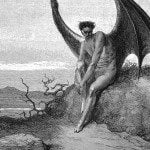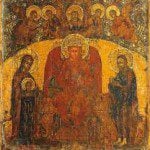“Everything that ascends must converge,” Pierre Teilhard de Chardin 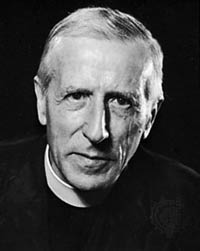 reflected. In a world that spins out of control the observations of this priest, mystic, scientist, and theologian seem more relevant than ever. The human spirit still struggles to converge.
reflected. In a world that spins out of control the observations of this priest, mystic, scientist, and theologian seem more relevant than ever. The human spirit still struggles to converge.
In mid-August, I visited Fr. de Chardin’s grave located at what had been a Jesuit novitiate at St. Andrews on the Hudson. Today, it is home to the Culinary Institute of America (CIA). The school is attentive and very respectful to the cemetery where Fr. de Chardin and other Jesuits are buried. The grass is neatly cut and an enclosed, locked iron gate suggests reverence for the sacred space. The cemetery remains in a relatively quiet section of the active campus. CIA’s very accommodating security staff was quick to provide a key allowing me to rest, reflect, and meditate indefinitely in the cemetery.
I brought a potted miniature red rose bush to set at Fr. de Chardin’s gravesite. I also added a rock to the others already laid on top of his 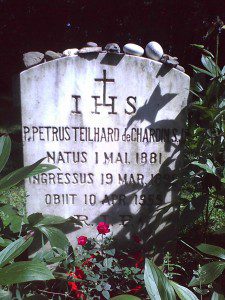 modest tombstone. My prayers were short, simple yet they became very experiential. Several narrow, horizontal streaks of warm, brilliant, and comforting red filled my eyes. There was something holy about being at the grave to experience a special stillness.
modest tombstone. My prayers were short, simple yet they became very experiential. Several narrow, horizontal streaks of warm, brilliant, and comforting red filled my eyes. There was something holy about being at the grave to experience a special stillness.
The experience brought me to a deeper level of reflection in the day that followed. I needed quiet and solitude like never before in thinking about the nonsensical world that many of us would like to either wake from or get off.
As an increasing number of intellectuals accept science as a kind of religion to replace or further marginalize faith, Fr. de Chardin called for in his day the “Christification of evolution” through “cosmogensis. He reminded Christians, causing consternation among many, that “our century is religious – probably more religious than any other (how could it fail to be with such vast horizons opening before it and with such problems to be solved?)”
He added that the “it has not yet the God it can adore.” Similarly, nothing has changed in the 21st century.
Fr. de Chardin, a trained geologist and paleontologist who 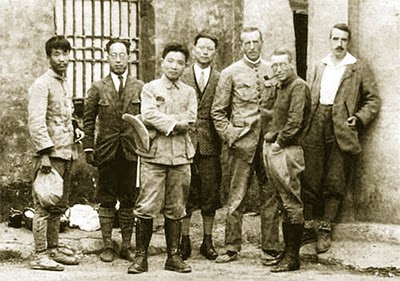 participated in the discovery of the Peking Man, connected the study of human origin with humanity’s spiritual growth and future. Paleontology was not only alive, but suggestive of the future.
participated in the discovery of the Peking Man, connected the study of human origin with humanity’s spiritual growth and future. Paleontology was not only alive, but suggestive of the future.
“Man can be understood only by ascending,” he wrote, “from physics, chemistry, biology, and geology. In other words he is first of all a cosmic problem.” Cosmogenesis, Biogenesis, Noogenesis, Christogenesis and a universe still to come were the foundation of his theology.
Fr. de Chardin believed it a gross mistake to compartmentalize everything without an effort to see the wholeness of Creation. Compartmentalization gives rise to spiritual and intellectual friction. Humankind is a “natural force” whose ancestry to ancient Asia or Africa is not a static anthropological history, but an ongoing spiritual awakening.
Christianity offers “tangibility,” “expansibility” especially by resurrection, and “assimilative power” through an organic process for “the totality of human kind …” It is the Christogenesis, the coming together of the cosmic ingredients of a great soup, that has not been mixed by the faithful in a modern age.
Hence, if approached and understood correctly evolution is the unity and convergence of everything. Personal struggles, successes, experiences of empathy, etc. coupled with the sciences and everything known and unknown about the universe contribute to the world soul.
Putting the issue in a broader perspective he wrote: “What distresses me is not that I am shackled by Christianity, but that Christianity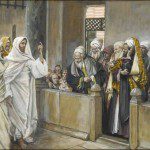 should at the moment be shackled by those who are its official guardians: the same problem that Jesus had to face two thousand years ago.”
should at the moment be shackled by those who are its official guardians: the same problem that Jesus had to face two thousand years ago.”
Does the universal Church, regardless of denomination, have the right guardians now? It’s a provocative question that should be asked and discussed by every generation as we, individually and collectively as the family of Creation, explore an organic, dynamic, synergetic wholeness.
Fr. de Chardin reposed on 10 April 1955, Easter Sunday.
Paul is author of Crucifying Jesus and Secularizing America – the Republic of Faith without Wisdom.




